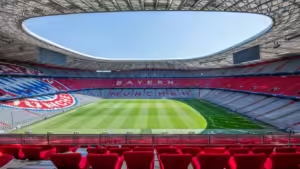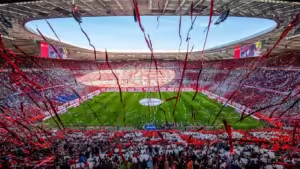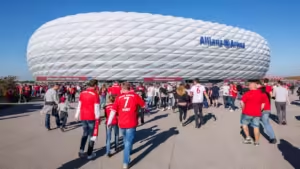Allianz Arena: The Architectural Marvel and Home of FC Bayern Munich
Allianz Arena is a magnificent stadium located in Munich, Germany, and is home to the famous football club FC Bayern Munich. The stadium is known for its unique architectural design, which has won numerous awards. It was designed by the renowned Swiss architects Herzog & de Meuron and was opened in May 2005, replacing Munich’s old Olympic Stadium as the new home for both Bayern Munich and TSV 1860 Munich.
The stadium’s exterior is covered with a translucent ETFE (ethylene tetrafluoroethylene) membrane, which can change color depending on the time of day and the events taking place inside the stadium. Allianz Arena can seat up to 75,000 spectators and has hosted numerous high-profile events, including the 2006 FIFA World Cup, the UEFA Champions League final, and the 2012 UEFA Champions League Final. The stadium is also accessible by public transport, making it easier for visitors to attend events.
Key Takeaways
- Allianz Arena is a magnificent stadium located in Munich, Germany, and is home to the famous football club FC Bayern Munich.
- The stadium’s unique architectural design, which has won numerous awards, was designed by the renowned Swiss architects Herzog & de Meuron.
- Allianz Arena has hosted numerous high-profile events, including the 2006 FIFA World Cup, the UEFA Champions League final, and the 2012 UEFA Champions League Final.
Architectural Design

The Allianz Arena is a remarkable architectural masterpiece located in Munich, Germany. Designed by Herzog & de Meuron, the stadium is home to FC Bayern Munich and TSV 1860 Munich. The stadium’s unique facade is a defining feature, which has won several awards and accolades.
Innovative Facade
The facade of the Allianz Arena is made up of 2,874 air-filled cushions, which can be illuminated in different colors, creating a stunning visual effect. The facade’s innovative design allows the stadium to change its appearance depending on the occasion. During Bayern Munich matches, the facade is lit up in red, while it turns blue when TSV 1860 Munich plays.
Stadium Structure
The Allianz Arena has a seating capacity of 75,000, making it one of the largest stadiums in Europe. The stadium’s construction began in 2002 and was completed in 2005, at a total cost of €280 million. The stadium has a unique bowl-shaped design, which ensures that every seat has an unobstructed view of the pitch.
Sustainability Features
The Allianz Arena is an eco-friendly stadium, with several sustainability features incorporated into its design. The stadium’s facade is made of a lightweight material, which reduces the amount of steel required for construction. The stadium also has a rainwater harvesting system, which is used to water the pitch and flush toilets. The stadium’s lighting system is energy-efficient, with over 2,760 LED lights used to illuminate the facade.
Overall, the Allianz Arena’s architectural design is a testament to the creativity and innovation of Herzog & de Meuron. The stadium’s unique facade, bowl-shaped design, and sustainability features make it one of the most iconic stadiums in the world.
Home of FC Bayern Munich

The Allianz Arena is the current home stadium of FC Bayern Munich, one of the most successful football clubs in the world. The club was founded in 1900 and has since won numerous domestic and international titles.
Club History and Achievements
FC Bayern Munich has a rich history of success, having won a record 31 Bundesliga titles, 20 DFB-Pokal titles, and 6 UEFA Champions League titles. The club has also won the FIFA Club World Cup twice and the UEFA Super Cup four times.
The club’s success has been built on a strong foundation of talented players, world-class coaching, and a dedicated fan base. Some of the most notable players to have played for the club include Franz Beckenbauer, Gerd Muller, Karl-Heinz Rummenigge, and Philipp Lahm.
Fan Culture
FC Bayern Munich has a passionate and dedicated fan base that spans the globe. The club’s supporters are known for their unwavering loyalty and their commitment to the team.
The Allianz Arena is known for its electric atmosphere, with fans creating a sea of red and white in the stands. The club’s supporters are also known for their creative and colorful displays, including giant banners and flags.
Overall, FC Bayern Munich and the Allianz Arena are synonymous with success and passion. The club’s history and achievements, combined with the passion of its fans, make it one of the most iconic and beloved football clubs in the world.
Events and Accessibility

National and International Matches
Allianz Arena is the home of FC Bayern Munich, one of the most successful football clubs in the world. The stadium has a seating capacity of 75,000 and is known for its unique architecture and innovative lighting system that allows the stadium to change colors based on the team playing. The stadium has hosted several national and international matches, including the 2006 FIFA World Cup.
During match days, the stadium is accessible to fans with disabilities. The stadium has designated seating areas for wheelchair users and their companions. Additionally, the stadium has accessible restrooms, parking spaces, and elevators.
Concerts and Public Events
Apart from football matches, Allianz Arena also hosts concerts and other public events. The stadium has hosted several high-profile concerts, including performances by Coldplay, U2, and Bon Jovi. The stadium is equipped with state-of-the-art sound and lighting systems that ensure a memorable experience for concert-goers.
The stadium also hosts public events, such as the annual Munich Oktoberfest. During the event, the stadium transforms into a giant beer hall, with several tents offering traditional Bavarian food and drinks.
Transportation and Parking
Allianz Arena is easily accessible by public transportation. The stadium is served by several bus and train lines, and there is a dedicated shuttle service that runs from the city center to the stadium on match days. The stadium also has several parking lots that can accommodate up to 9,800 cars.
Visitors are advised to arrive early on match days to avoid traffic and parking congestion. The stadium has several entrances, and visitors are advised to check their tickets for the correct entrance. Additionally, visitors are advised to follow the stadium’s code of conduct and security guidelines to ensure a safe and enjoyable experience.
Frequently Asked Questions
How can I purchase tickets for a match at Allianz Arena?
Tickets for matches at the Allianz Arena can be purchased online through the official FC Bayern Munich website. It is recommended to purchase tickets in advance as they often sell out quickly. Fans can also purchase tickets at the stadium box office on match days, but availability may be limited.
What are the unique architectural features of the Allianz Arena?
The Allianz Arena is known for its striking exterior, which is made up of over 2,800 ETFE panels that can be illuminated in various colors. The stadium was designed by Swiss architects Herzog & de Meuron and was completed in 2005. The stadium’s interior features a modern design with excellent sightlines and seating options for fans.
Can you take a tour of the Allianz Arena, and how do you book it?
Yes, visitors can take a guided tour of the Allianz Arena to learn more about its history and unique features. Tours are available in several languages and typically last around an hour. Tickets can be purchased online or at the stadium box office.
What is the seating capacity of Allianz Arena?
The Allianz Arena has a seating capacity of 75,000 for football matches. The stadium is also used for other events such as concerts, which may have a different seating configuration.
How does the Allianz Arena’s illumination system work?
The Allianz Arena’s illumination system is made up of over 8,000 LED lights that can be programmed to display different colors and patterns. The system is controlled by a computer and can be used to create stunning visual displays during matches and other events.
What facilities are available for fans at the Allianz Arena during match days?
The Allianz Arena offers a range of facilities for fans, including several restaurants and bars, merchandise shops, and a fan zone with activities for children. The stadium also has excellent accessibility features, including wheelchair accessible seating and restrooms.
Other Match Articles:
Check Out: Turf Moor: The Fortress and Historic Home of Burnley FC
Check Out: Etihad Stadium: Where Manchester City’s Dreams Take Flight
Check Out: Cricket’s Heartbeat in Johannesburg: Inside Bidvest Wanderers Stadium
Check Out: Where Champions Are Made: Exploring the Iconic Nelson Mandela Bay Stadium
Check Out: Twickenham Stadium: England’s Hallowed Ground of Sporting Majesty – Where Rugby Royalty Reigns
Tags: Allianz Arena: The Architectural Marvel and Home of FC Bayern Munich, Architectural Design, Events and Accessibility, Frequently Asked Questions, Home of FC Bayern Munich
